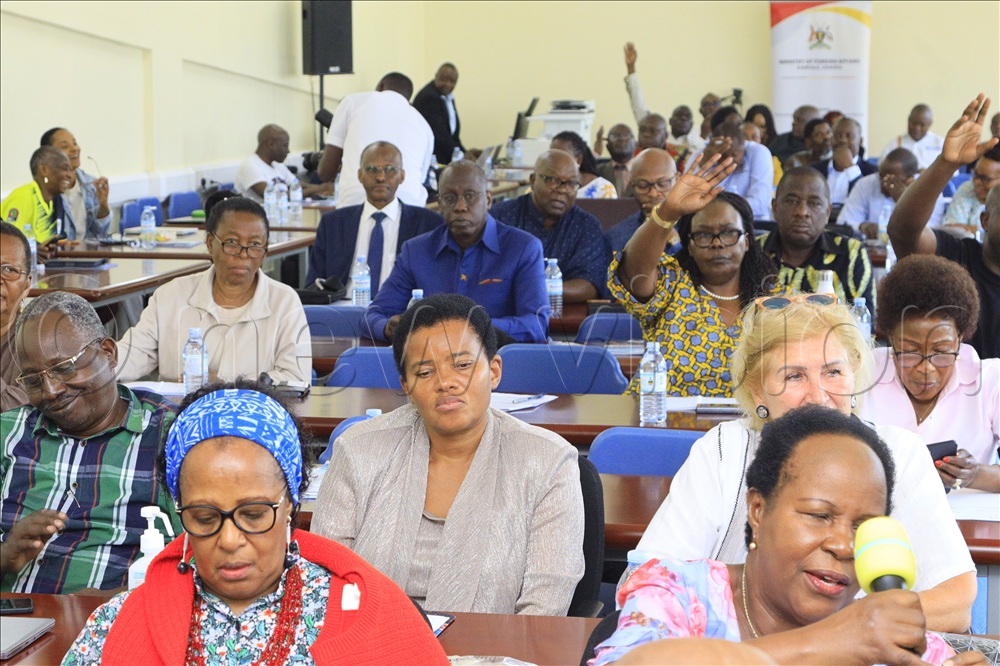Uganda banks on its missions abroad to expand tourism revenue
UTB chief executive officer Juliana Kagwa said that while other sectors are expected to grow tenfold, tourism must grow 25-fold.
Juliana Kagwa (left), the UTB CEO together with her staff, Francis Nyende (centre), the marketing manager and Daniel Irunga, the brand manager talking to Uganda's ambassadors during their retreat in Gulu. ( Photos by Julius Luwemba)
________________
The fourth National Development Plan (NDPIV) 2025/26–2029/30 aims to deliver tenfold economic growth, expected to be achieved by doubling the size of the economy every five years.
This will be driven through agro-industrialisation, tourism, minerals including oil and gas, and science, technology and innovation.
Against this backdrop, the Uganda Tourism Board (UTB) has intensified its campaign with foreign missions and embassies to market the Pearl of Africa as a desired tourist destination.
Speaking to Uganda’s ambassadors on September 5, 2025, at the close of a five-day conference in Gulu district, UTB chief executive officer Juliana Kagwa said that while other sectors are expected to grow tenfold, tourism must grow 25-fold.
Francis Nyende, the UTB marketing manager, highlighted the new national tourism marketing strategy launched in May.
According to him, the strategy focuses on boosting tourism-related research and uptake, diversifying tourism products, improving infrastructure such as transport, electricity, trails and accommodation, and addressing the tourism skills gap.

Some of Uganda's ambassadors during their retreat in Gulu.
He added that it also aims to strengthen enforcement of tourism standards and regulations, alongside enhancing conservation and protection of natural resources.
Rallying Uganda’s ambassadors during the retreat, UTB officials noted that international tourist arrivals worldwide reached 1.3 billion in 2023, valued at $1.9 trillion, up 34% from 2022. However, Uganda attracted only 1.5 million inbound tourists, worth less than $4 billion, representing just 0.02% of the global industry value.
UTB spokesperson Simplicious Gessa said the recovery of the global tourism industry presents Uganda with an opportunity to rebrand and increase foreign exchange earnings.
Kagwa emphasised that although a marketing strategy exists, efforts are dispersed across several agencies and ministries, including the Ministry of Foreign Affairs.
Margaret Kafeero, the head of public diplomacy at the ministry, noted that the newly launched economic and commercial diplomacy handbook allocates sh120 billion annually to all foreign missions and the ministry headquarters to market Uganda’s key growth sectors.
According to the handbook, this annual funding will address capacity gaps and enable coordinated activities among partner entities. The strategy identifies missions abroad as strategic agents for attracting opportunities in key growth sectors such as tourism, agro-industrialisation, mineral development, science and technology to drive economic growth over the next 15 years.
In November 2024, 28 tour operators and journalists from Indonesia, Vietnam, the Philippines and Thailand visited Uganda for a 14-day tour organised by the Ugandan embassy in Malaysia, led by Betty Bigombe in partnership with UTB. The trip showcased Uganda’s landscapes, climate, wildlife and cultural diversity for the Asian market.
Other foreign missions, including those in Qatar, the United Arab Emirates and Türkiye, have since brought further delegations to Uganda. The most recent group was led by Uganda’s ambassador to Türkiye, Nusura Tiperu.
Foreign affairs ministry permanent secretary Vincent Bagiire Waiswa stressed the critical role of foreign missions in attracting tourists.
He pointed to the recently concluded Rwenzori Marathon, where missions attracted participants from 35 countries.
“We hope that next year, we shall have participants from 50 countries across the globe,” he remarked. Bagiire added that Uganda’s diplomats are trained to market tourism, promote exports and negotiate bilateral agreements.
Tourism remains central to Uganda’s economy, contributing 6.6% of GDP and directly employing over 800,000 people. The country’s diverse landscapes, cultural heritage and wildlife continue to attract high-value travellers seeking authentic, nature-based and sustainable experiences.